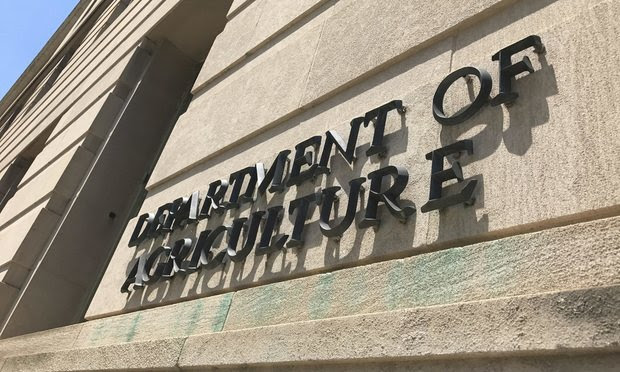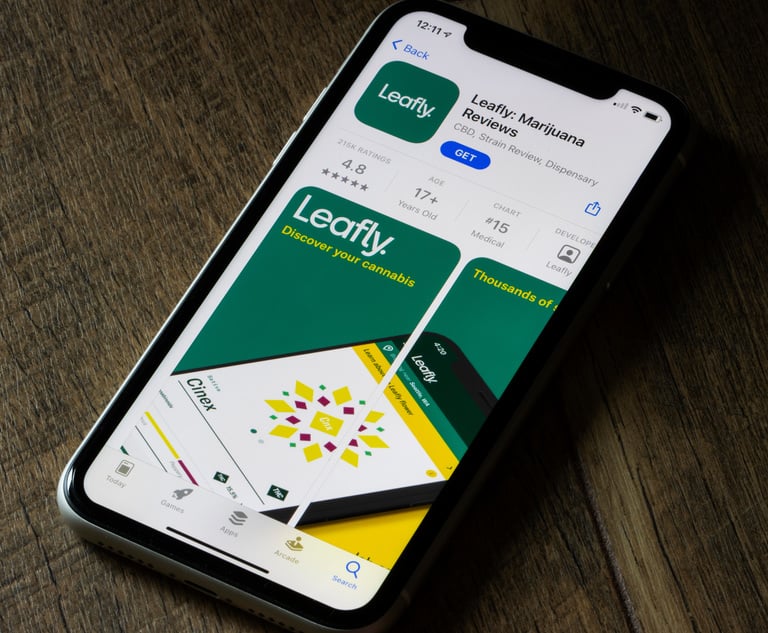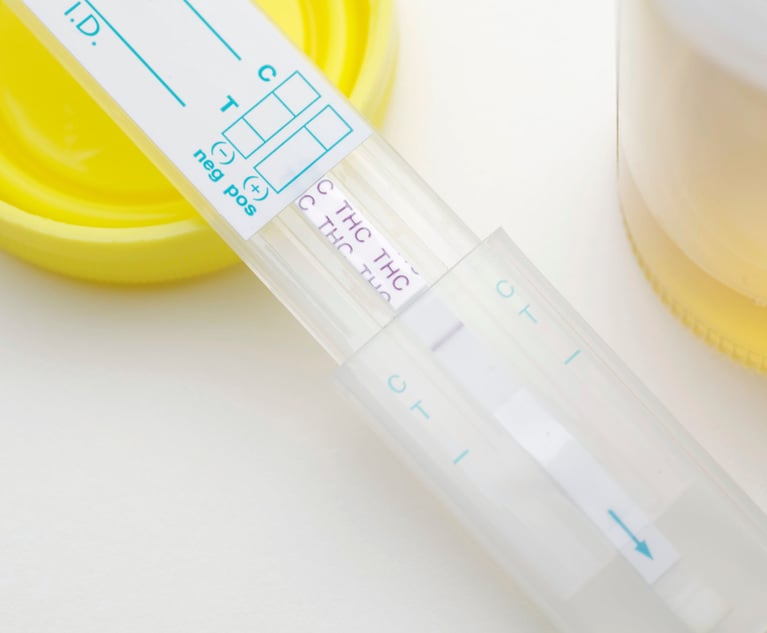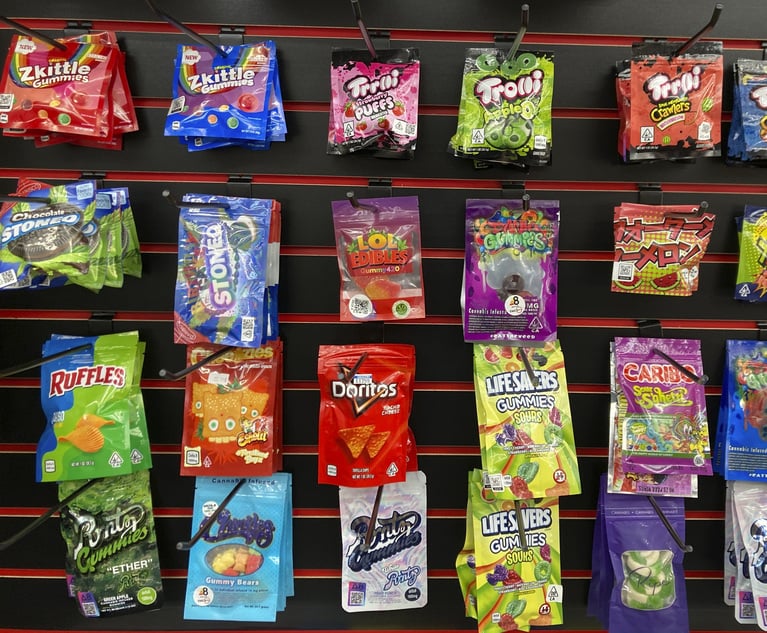Insights: USDA Hemp Rules Released | Winning and Settling With Eaze | McDermott's New Hire | Who Got the Work
What lawyers have to say about new USDA hemp rules. Action on the Eaze litigation front. A return to cannabis law for one McDermott Will & Emery partner. Plus: Who Got the Work, and so much more.
October 31, 2019 at 04:00 PM
11 minute read
Welcome back to Higher Law, our weekly briefing on all things cannabis. I'm Cheryl Miller, reporting for Law.com from Sacramento, which sometimes seems like the only place in Northern California where the lights have stayed on recently.
This week we're looking at:
• What lawyers have to say about new USDA hemp rules
• Action on the Eaze litigation front
• A return to cannabis law for one McDermott Will & Emery partner
• Mr. T, Mr. Tusk and cannabis trademarks
Thanks and welcome back, Higher Lawyers. Drop that candy bar you stole from your kid's Halloween stash and send me your thoughts and tips at [email protected]. Or call me at 916.448.2935. Follow me on Twitter @capitalaccounts.

The New Handbook on Hemp: Thoughts from Practice Leaders
The (interim) hemp rules are finally here! The U.S. Department of Agriculture released the long-awaited draft regs this week and published them in the Federal Register as soon as Thursday.
We're still sifting through the 161 pages of guidance on how to legally grow, transport and sell hemp in accordance with its federal legalization in the 2018 Farm Bill. But a quick skim shows provisions for states and Native American tribes filing plans with the USDA, THC-level testing, plant disposal, personnel restrictions and interstate shipments.
Here are some legal takes on the rules:
Seth Goldberg, team lead for the Duane Morris cannabis industry group, in a client alert:
"One of the most noteworthy aspects of the USDA's draft rules is what is not included: mention of hemp-derived CBD in food, dietary supplements or other similar items." That authority is explicitly left to the U.S. Food and Drug Administration, Goldberg notes.
 "On the whole, the fact that hemp has been decriminalized at the federal level and that the USDA has finally moved closer to approving state hemp plans under its to-be-published rules clearly eliminates a primary source of confusion for those in the hemp industry. But what is just as evident is that despite enhanced clarity on the federal level, whether industry participants will thrive or falter will hinge in part on navigating the complex network of fluctuating, often inconsistent state laws and regulations."
"On the whole, the fact that hemp has been decriminalized at the federal level and that the USDA has finally moved closer to approving state hemp plans under its to-be-published rules clearly eliminates a primary source of confusion for those in the hemp industry. But what is just as evident is that despite enhanced clarity on the federal level, whether industry participants will thrive or falter will hinge in part on navigating the complex network of fluctuating, often inconsistent state laws and regulations."
Greg Kaufman, co-leader of Eversheds Sutherland's cannabis practice:
"The USDA interim final rule contains few surprises and is largely consistent with the program rules adopted by or currently being considered by certain states. Market participants may be disappointed that the rule does not go into effect until two years from the date of publication in the Federal Register. More importantly, market participants should pay close attention to particular provisions of the rule that ask for additional comment. In particular, close attention should be paid to the 15-day sampling and harvest timeline proposed."
"In addition, the rule provisions governing negligent acts should be considered given the reliance of the phrase 'reasonable efforts' to grow hemp. What qualifies as reasonable is likely to change over time to the detriment of producers. Finally, one area not identified for additional comment is the use of Total THC as a measure against the 0.3 percent threshold."
Harris Bricken attorney Daniel Shortt on Canna Law Blog:
"These interim hemp rules also outline hemp violations, the appeal process for hemp licensing, and touch on the interplay with the Controlled Substances Act. More than anything else, the USDA's release of these rules means that we are finally headed towards full implementation of the 2018 Farm Bill. We expect the USDA to be inundated with state and Tribal hemp plans and applications for USDA hemp production licenses over the next few weeks, and then again early next year after many state legislatures reconvene."
Rod Kight of Kight Law Office:
"Every crisis presents opportunities. In this case, the USDA rule presents significant opportunities for the few Labs that hold DEA registrations and the genetics producers that have cultivars with reliably low total THC concentrations. However, these provisions have the potential to provoke a general crisis in the industry at large as the majority of participants struggle to find solutions. Although I tend to be an optimist, I am concerned about how these two provisions will impact the industry."
>> The USDA will take public comments on the interim final rules through Dec. 30

Litigation Update: Delivery Platform Eaze
Eaze and its attorneys at Boies Schiller Flexner won one case—for now—and are poised to settle another alleging that the delivery platform sent unwanted text messages to customers and others.
Last week a federal judge in San Francisco dismissed a proposed class action brought under the Telephone Consumer Protection Act, finding that the lead plaintiff had to pursue her claims in arbitration.
"The court correctly found that cannabis companies are not barred from forming and enforcing basic contracts, and that Eaze's business is legal under California state law," said Boies Schiller partner Albert Giang, who defended the company along with partner Michael Roth. "This ruling sets an important precedent for California's legal cannabis market, and more broadly for the legal cannabis industry in America."
Williams' attorneys at San Francisco plaintiffs firm Hedin Hall filed a notice of appeal in the case on Wednesday.
The same group of attorneys have reached a potential settlement in a related TCPA suit, Lloyd v. Eaze. According to documents filed in the U.S. District Court for the Northern District of California on Friday, Eaze leaders has agreed to pay $50 to consumers for each qualifying, improper text they received. The company will also pay $437,500 to class counsel, institute TCPA compliance training and include opt-out notifications in certain text messages.
The new settlement will cost Eaze just under $3.5 million, about twice the value of a previous proposed settlement rejected by the court. A hearing on the proposed deal has been set for Dec. 5.
>> More reading at The Recorder, a short Q&A with Andrea Lobato, chief risk officer at Eaze, named one of the publication's 21 women leaders in tech law. On her proudest professional achievement in the past year: "Building an incredible in-house legal and compliance team. As a company in the cannabis space, we have a lot of novel complex commercial, corporate, insurance, regulatory, litigation and privacy issues that we face. The Eaze legal and compliance team works together like a well-oiled machine to tackle these issues.

A Regulated Markets Veteran Joins McDermott Will & Emery
Alva Mather, the one-time head of Pepper Hamilton's alcoholic beverages practice who joined DLA Piper's Philadelphia office last year, has now made another move, to McDermott Will & Emery in Washington, my colleague Lizzie McLellan reports. Mather has joined the firm's alcohol, regulatory and distribution group and will succeed Marc Sorini as head of the practice at the end of the year.
Mather, chair of the American Bar Association's Cannabis and Alcoholic Beverages Subcommittee, said she had to give up working in the cannabis space when she joined DLA Piper last year. While the main focus of her move has been the new leadership role in the regulatory group, she said it will be "icing on the cake" that she can resume some of her cannabis-related work.
"If you look at recreational or legalized marijuana in the western part of the country, they are housed in the same regulatory agencies [as alcohol], and the same regulatory structures are in place or very similar regulatory structures are in place," Mather said. If and when federal law on cannabis catches up to some of the state laws legalizing it, the alcohol and cannabis industries will likely consolidate, she said.
Who Got the Work
>> Mr. T v. Leafly Holdings. Yes, you read that right. The mohawked tough guy, represented by Los Angeles firm Cislo & Thomas, is suing cannabis information site Leafly for trademark infringement. Mr. T, born Lawrence Tureaud, says Leafly's use of the symbol "Mrt" to represent hybrid marijuana strain "Mr. Tusk" on its site could suggest he's endorsing the product. Leafly, represented by a Davis Wright Tremaine team, told TMZ "We pity the absurdity of this claim." Bloomberg Law has more on the case, filed in late August, here.
>> On the lobbying front: ACG Analytics is now lobbying for the American Trade Association for Cannabis and Hemp and the Colorado-based Policy Center for Public Health and Safety. Both entities are interested in federal issues affecting the cannabis industry, according to filings. Also, Veterans Health Action Inc. has retained Navigators Global in Washington, D.C., for lobbying work on "issues related to medical and cannabis research, federal banking guidance, and veterans health issues." Navigators Global also lobbies for cannabis company Curaleaf Inc.

In the Weeds
>> Customs agents are just saying no to marijuana packaging imports. Washington state marijuana business owners say the U.S. Customs and Border Patrol has been seizing glass jars and packaging products at the Tacoma port as illegal "drug paraphernalia." "If you read the case law, and what federal drug paraphernalia is defined as, glass jars are not contemplated," Cultiva Law attorney Aaron Pelly told The Spokesman-Review. An agency spokesman said there's no new emphasis on confiscating ancillary marijuana products. [The Spokesman-Review]
>> The IRS has won another 280E marijuana case. This time medical marijuana company Northern California Small Business Assistants Inc. argued that Section 280E's ban on expense deductions for state-licensed cannabis businesses violates the Eighth Amendment's prohibition on excessive fines. But the U.S. Tax Court held that 280E isn't about penalties. "Disallowing a deduction from gross income is not a punishment," Senior Judge Joseph Goeke wrote. [Bloomberg Tax]
>> Know the regulatory world—and the real risks of cannabis work. Gigi Birchfield and Ashley McCall of Major, Lindsey and Africa offered some advice for succeeding in-house in the cannabis industry." Being up-to-speed on cannabis regulation isn't a prerequisite, but regulatory experience is a plus," they write. "With the constantly shifting regulatory landscape and resulting volatility in the marketplace, take a careful look to see if the company you're considering can weather the storm and emerge as a market leader," they add. [Corporate Counsel]
>> An appellate court won't push the DEA to issue research licenses. The U.S. Court of Appeals for the District of Columbia on Friday dismissed a lawsuit filed this summer by the Scottsdale Research Institute that accused the DEA of dragging its feet issuing licenses for entities that want to grow their own marijuana for research purposes. The DEA has announced it intends to promulgate regulations to review several dozen applications to grow research marijuana. [NORML] [Westword]
>> Maryland's licensing program is on hold and under investigation. The state received more than 200 applications for four marijuana growing and 10 processing licenses. One investigation will scrutinize the license review process, which has been challenged in court by an applicant that was denied a permit. Another investigation will check the accuracy of information submitted by applicants that received high rankings in the selection process. [The Baltimore Sun]

The Calendar: What's Going On
Nov. 1 - The state of Michigan begins accepting applications for recreational marijuana licenses. Don't expect legal sales to start until March or April.
Nov. 5-6 - The Professional Manufacturing Confectioners Association hosts the Cannabis in Confections & Snacks Science Symposium in Sacramento, California. Scheduled speakers include Leland, Parachini, Steinberg, Matzger & Melnick associate Javier Bastidas and Chad Finkelstein, a partner at Dale & Lessmann.
This content has been archived. It is available through our partners, LexisNexis® and Bloomberg Law.
To view this content, please continue to their sites.
Not a Lexis Subscriber?
Subscribe Now
Not a Bloomberg Law Subscriber?
Subscribe Now
NOT FOR REPRINT
© 2025 ALM Global, LLC, All Rights Reserved. Request academic re-use from www.copyright.com. All other uses, submit a request to [email protected]. For more information visit Asset & Logo Licensing.
You Might Like
View All
NY Cannabis Marketing Rulings / Rescheduling Effects / Honigman's Work on Trademark Suit / Goodbye
9 minute read
Workplace Weed and Labor Pacts / State AGs and Hemp / Maryland Licensing Suit / Vicente Sues Recruiter
9 minute readTrending Stories
- 1No Two Wildfires Alike: Lawyers Take Different Legal Strategies in California
- 2Poop-Themed Dog Toy OK as Parody, but Still Tarnished Jack Daniel’s Brand, Court Says
- 3Meet the New President of NY's Association of Trial Court Jurists
- 4Lawyers' Phones Are Ringing: What Should Employers Do If ICE Raids Their Business?
- 5Freshfields Hires Ex-SEC Corporate Finance Director in Silicon Valley
Who Got The Work
J. Brugh Lower of Gibbons has entered an appearance for industrial equipment supplier Devco Corporation in a pending trademark infringement lawsuit. The suit, accusing the defendant of selling knock-off Graco products, was filed Dec. 18 in New Jersey District Court by Rivkin Radler on behalf of Graco Inc. and Graco Minnesota. The case, assigned to U.S. District Judge Zahid N. Quraishi, is 3:24-cv-11294, Graco Inc. et al v. Devco Corporation.
Who Got The Work
Rebecca Maller-Stein and Kent A. Yalowitz of Arnold & Porter Kaye Scholer have entered their appearances for Hanaco Venture Capital and its executives, Lior Prosor and David Frankel, in a pending securities lawsuit. The action, filed on Dec. 24 in New York Southern District Court by Zell, Aron & Co. on behalf of Goldeneye Advisors, accuses the defendants of negligently and fraudulently managing the plaintiff's $1 million investment. The case, assigned to U.S. District Judge Vernon S. Broderick, is 1:24-cv-09918, Goldeneye Advisors, LLC v. Hanaco Venture Capital, Ltd. et al.
Who Got The Work
Attorneys from A&O Shearman has stepped in as defense counsel for Toronto-Dominion Bank and other defendants in a pending securities class action. The suit, filed Dec. 11 in New York Southern District Court by Bleichmar Fonti & Auld, accuses the defendants of concealing the bank's 'pervasive' deficiencies in regards to its compliance with the Bank Secrecy Act and the quality of its anti-money laundering controls. The case, assigned to U.S. District Judge Arun Subramanian, is 1:24-cv-09445, Gonzalez v. The Toronto-Dominion Bank et al.
Who Got The Work
Crown Castle International, a Pennsylvania company providing shared communications infrastructure, has turned to Luke D. Wolf of Gordon Rees Scully Mansukhani to fend off a pending breach-of-contract lawsuit. The court action, filed Nov. 25 in Michigan Eastern District Court by Hooper Hathaway PC on behalf of The Town Residences LLC, accuses Crown Castle of failing to transfer approximately $30,000 in utility payments from T-Mobile in breach of a roof-top lease and assignment agreement. The case, assigned to U.S. District Judge Susan K. Declercq, is 2:24-cv-13131, The Town Residences LLC v. T-Mobile US, Inc. et al.
Who Got The Work
Wilfred P. Coronato and Daniel M. Schwartz of McCarter & English have stepped in as defense counsel to Electrolux Home Products Inc. in a pending product liability lawsuit. The court action, filed Nov. 26 in New York Eastern District Court by Poulos Lopiccolo PC and Nagel Rice LLP on behalf of David Stern, alleges that the defendant's refrigerators’ drawers and shelving repeatedly break and fall apart within months after purchase. The case, assigned to U.S. District Judge Joan M. Azrack, is 2:24-cv-08204, Stern v. Electrolux Home Products, Inc.
Featured Firms
Law Offices of Gary Martin Hays & Associates, P.C.
(470) 294-1674
Law Offices of Mark E. Salomone
(857) 444-6468
Smith & Hassler
(713) 739-1250










